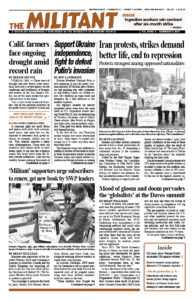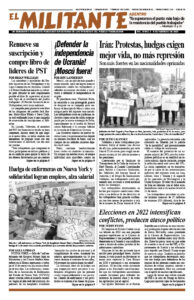A mood of doom and gloom hovered over the gathering of some 2,700 bosses, bankers, speculators, government officials and meritocratic hangers-on at the World Economic Forum in Davos, Switzerland, Jan. 16-20. Underlying their despondency is the sharpening political and social crisis confronting capitalist rivals, the impact of Moscow’s invasion of Ukraine and their fears that the crisis of the capitalist system today will drive more struggles by working people and the oppressed.
Since 1971, “the World Economic Forum in Davos has been the meeting place and cheerleader for global capitalism,” wrote Financial Times columnist Martin Wolf Jan. 18. But today, “perceptions have, in sum, shifted towards ‘dog eats dog.’”
In fact, the theme of this year’s conference — registration fees could run $250,000 — was “Cooperation in a Fragmented World.” Conspicuous by their absence were heads of government. German Chancellor Olaf Scholz was the only one from the Group of Seven powers in attendance. No big capitalists came from Russia.
The get-together occurred as competition and tensions among the U.S. and other capitalist powers for markets and raw materials increases amid declining production and trade, rising inflation, and the first full-scale war between two state powers on the European continent in over 75 years.
At the same time, a rise in working-class resistance is underway, with protests against rising prices and declining living conditions from France to Panama to Indonesia. There’s been an important uptick in strikes, from rail workers in the United Kingdom to coal miners in Alabama. More workers in the U.S. are fighting for, and looking to join, unions.
The bosses and their governments increasingly fear what the future holds for their class. Pricewaterhouse Coopers reported that nearly 40% of more than 4,400 CEOs recently surveyed said their companies would not be viable over the next decade unless they “transformed at a faster pace” — bosses’ code words for layoffs and speedup on the job.
This crisis is also transforming political and military alignments. “‘Spheres of influence’ that had shaped the global imperialist order since Washington emerged as the dominant power coming out of World War II — are being shaken and new alliances between competing states put together,” says a Socialist Workers Party resolution published in The Low Point of Labor Resistance Is Behind Us: The Socialist Workers Party Looks Forward by Jack Barnes, Mary-Alice Waters and Steve Clark. “Working people the world over are hit by the effects of growing global conflicts over trade, currency, raw materials, and immigration.”
The consequences of Moscow’s invasion of Ukraine “are only beginning to be registered worldwide,” the resolution states, “and the economic, political, and military shifts and uncertainties it creates, are temporarily overshadowing other ‘great power’ conflicts, such as the long-smoldering confrontation between China and the US-led imperialist governments in the Pacific.”
President Joseph Biden repeatedly says Washington will respond militarily to any steps by Beijing to impose its direct domination over Taiwan. Since the formation of the AUKUS military pact in 2021 between the governments of Australia, the U.K. and the U.S., the ruling class in Japan, another crucial ally of Washington, has embarked on the biggest military buildup since World War II.
Over several years the Chinese government has fortified armed outposts on island chains claimed by other Asian regimes, from Japan to Vietnam, the Philippines and others. In his Chinese New Year message Jan. 20, President Xi Jinping said Beijing was “fighting resolutely in major struggles against separatism and foreign interference,” in its relations with Taiwan.
Washington maintains some 28,000 troops and massive armaments in South Korea, ready for use in the region.
Meanwhile, China’s economy, which was looked to by the well-heeled attendees at Davos for decades as a key arena for capitalist profits, has slowed to one of its lowest levels since 1976. The increase in the country’s gross domestic product was at 3% last year, a drop from 8.1% in 2021.
At the same time China’s giant property bubble has burst, with declining sales of homes and land and widespread job losses by construction workers. And for the first time in decades the Chinese population declined in 2022.
The U.S. economy is also slowing down. Retail sales fell by 1.1% in December — usually the biggest month for holiday purchases. Manufacturing output dropped by the largest amount in nearly two years that month.
Despite the problems registered at Davos, “an internationally open capitalism remains the foundation of future prosperity,” Financial Times columnist Wolf proclaims. Yet all the evidence shows it is in fact the foundation for sharper crises, more national conflicts and wars, and deeper struggles by workers and farmers. Out of such battles working people will have the opportunity to forge the leadership our class needs.

